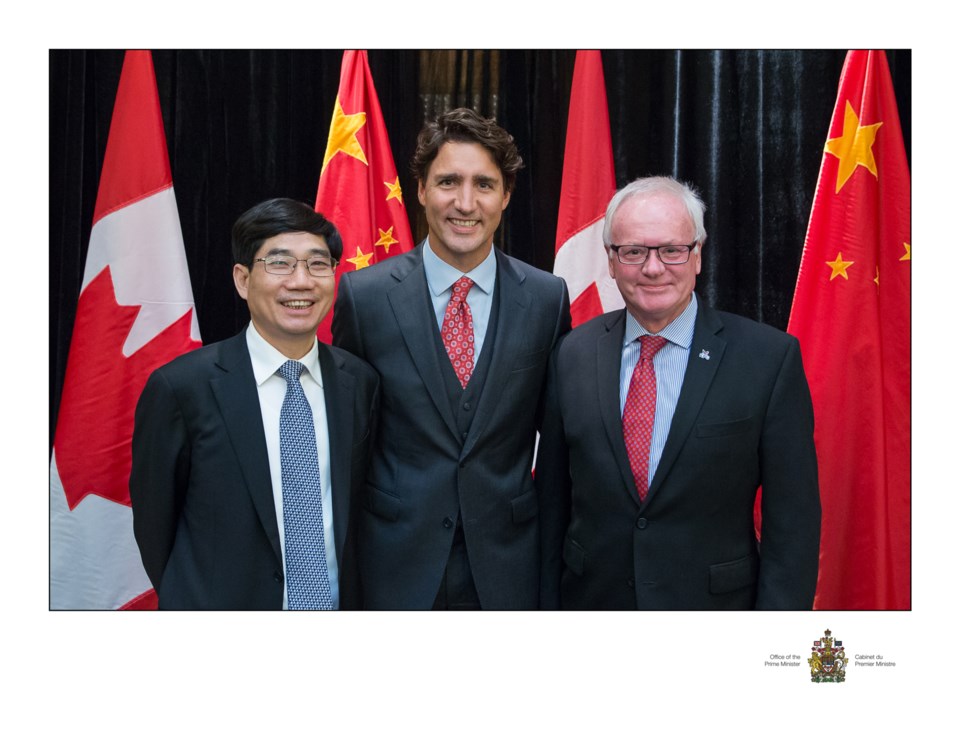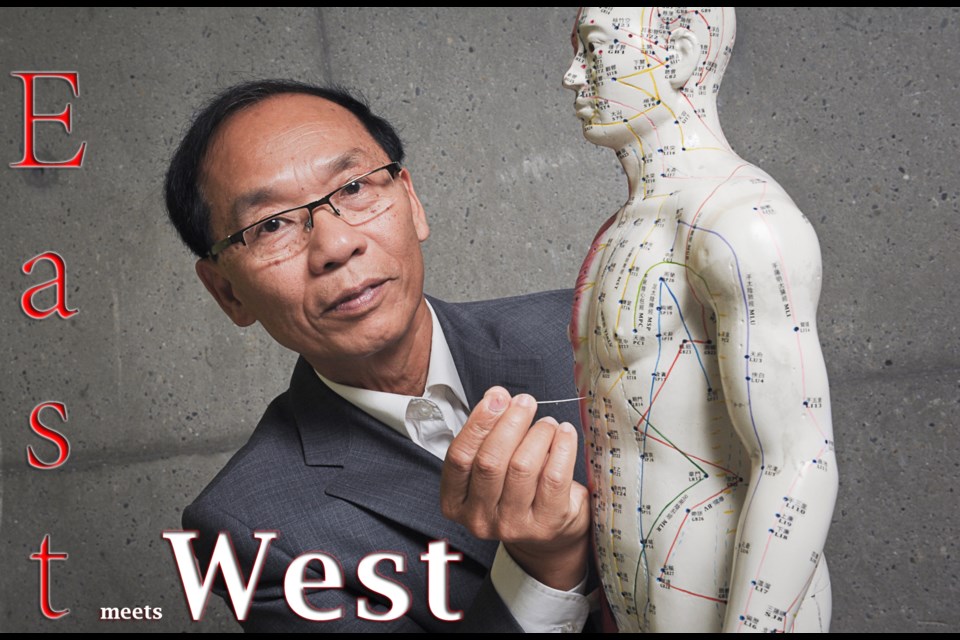Considering the growth in Richmond’s ethnic Chinese population over the past two decades, it should come as no surprise that Kwantlen Polytechnic University is home to a new, unique partnership with a Beijing-based university that will help students obtain a degree in traditional Chinese medicine (TCM).
The partnership is the first of its kind with a public post-secondary school in B.C. Come 2018, graduates of KPU’s intensive, two-year acupuncture program, which commenced this week, will have the opportunity to become fully accredited TCM practitioners by converting their acupuncture diplomas into TCM degrees from Beijing University of Chinese Medicine (BUCM).
“This moment is so many things for us — it’s historical, it’s thrilling, and it’s a major achievement for the two leadership teams from KPU and BUCM, but most of all it’s a once-in-a-lifetime opportunity for graduates of KPU’s acupuncture diploma program,” said Dr. Alan Davis, president and vice-chancellor of KPU.
Of the 1,761 licensed practitioners of TCM in B.C., 261 are located in Richmond. One of those practitioners is Ying Shen Wu, a doctor of traditional Chinese medicine, who specializes in many facets of TCM, including acupuncture, herbal medicine, stone therapy, Tai Chi and Chi Gong, at his business, YS Traditional Chinese Medicine and Martial Arts College, on Voyageur Way in northeast Richmond.
TCM aims to balance your chi
Wu said TCM is gaining in popularity in the Lower Mainland and across North America, as Westerners seek out alternatives to modern medicine, particularly painkillers.
“We take a holistic approach. If a patient comes to me with a headache, I don’t just give him painkillers to treat his head. Maybe I treat his organs. We believe in Chi, which is energy within the body,” said Wu.
“TCM is focused on body functions, not just scientific theories. This has existed for several thousand years in China,” he said.
At Wu’s practice, he may perform a host of treatments, from prescribing Chinese medicines, such as ginseng root, to Eastern meditation. He runs Tai Chi classes for youth and Chi Gong classes for adults. Chi Gong is a philosophy that teaches body movements, breathing techniques and self-awareness to balance one’s qi (chi), or life energy.
“This is the original concept of TCM,” said Wu, noting his patients study to regulate yin and yang in the body to improve the flow of chi.
Wu came to Canada in 2002, from his home city of Guangzhou, where he learned TCM from his father while studying statistics and probability at university. He works with his wife, Fion, who manages the business. They have two school-age children and live near Francis Road and Railway Avenue.
Wu said TCM is gaining in popularity among non-Chinese people, whom he estimates make up about 40 per cent of his clientele.
It is practitioners such as Wu that KPU hopes to graduate. Wu is a licensed professional in a burgeoning sector of the healthcare system.

Demand for TCM high
This year, KPU accepted six students into its acupuncture diploma program, after announcing its formation in 2014. Applicants must have 60 general undergraduate credits and then go on to complete 86 credits and 460 hours of clinical practice over six semesters.
“The demand for acupuncture education, and the popularity of acupuncture as a complementary medical treatment in B.C., are both clear,” said KPU provost and vice-president academic, Salvador Ferreras. “To that end, KPU is excited to lead the way in meeting the needs of its students as well as their future patients.”
“By choosing to further their studies at BUCM, KPU’s acupuncture diploma graduates will expand their knowledge of TCM to include massage, herbology, dietary therapy and other important TCM-related studies,” said Ferreras.
KPU noted three years of consultation culminated in the signing of an MOU on Sept. 1 during the official visit to China by Prime Minister Justin Trudeau, who met with officials from BUCM, which is described as the top university in China for this field of study.
This year, KPU instructor Dr. John Yang will teach the first students eligible to study in China.
Yang initially practised Western medicine in China but turned his focus to traditional Chinese medicine and eventually got a PhD in the field at Guangzhou University of Chinese Medicine. He immigrated to Canada 27 years ago and started teaching acupuncture at a private school 15 years ago.
He describes TCM as a “totally different thinking and mindset.”
For instance, acupuncturists believe in what’s described as body meridians, or energy channels.
“So, registered acupuncturists have the ability to identify which energy channel and at what location vital energy is blocked or deficient, so they can then insert a very small needle in the skin and, using a technique, manipulate to open up that invisible meridian channel and let the disrupted situation return to a normal, dynamic position,” explained Yang.
Yang also said acupuncture is gaining the support of the public. But he said in the Western world, mainstream medical authorities don’t provide much funding for TCM research.
“This doesn’t reflect the truth of this profession,” said Yang.
Some may still believe there’s a placebo effect to TCM, Yang admitted, but this still doesn’t explain the healing results most people experience, he noted.
KPU Faculty of Health associate dean Dr. Jean Nicolson-Church, a registered nurse, said medical literature does support TCM.
“Certainly in our nursing programs we embrace the alternative and complimentary types of medicine,” said Nicolson-Church.
Health and ethical standards are increasingly becoming more robust, given the industry’s relative infancy. KPU acupuncture graduates will be regulated by the College of Traditional Chinese Medicine Practitioners and Acupuncturists of B.C. (CTCMA), which formed in 1999. CTCMA began licensing practitioners in 2003.
Wu, a doctor of TCM (well-educated practitioners can be labelled doctors but not necessarily hold a PhD or medical degree), said it is important for anyone seeking out TCM as a therapy to ensure that a practitioner is licensed by the college.
“The first thing you need to do is check if someone has a licence. Second, ask how many years they have experience,” said Wu.
“It’s very dangerous (if they are not licensed) because they are not under standards. The needles, you don’t know if they’re clean or not,” said Wu, whose business is checked annually by the self-regulating college. Additionally, Wu must comply with a continued education program annually to keep abreast of changes to professional standards and practices.
He said the regime can actually result in better TCM treatment here in B.C. than in China.
“I think TCM here is better than in China. In China, in one clinic, my father will have more than 20 patients in one morning. But here, there’s not that many patients. I have more focus on them. Normally, I will give them 45 minutes. In China it’s just 20 minutes and they get out,” said Wu.
CTCMA registrar Dr. Mary Watterson said people can check if a practitioner is licensed at the website CTCMA.bc.ca.
“They should contact us immediately if the person treating them is not registered,” she said.
This issue came to light most recently in Richmond when, in June, the B.C. Supreme Court issued permanent injunctions against tenants Jhan Jhan Lee and Wai Cheong Chik running an underground TCM clinic out of their Richmond home.
The investigation on Colville Road revealed thousands of acupuncture needles and hypodermic syringes and thousands of clinical records dating back to 2004.
“These two individuals are examples of the imposters that prey on the public, providing cheap unregulated health care to vulnerable unwell people,” stated Watterson at the time.
The investigation was sparked by an anonymous complaint that the clinic was operating. CTCMA investigators reported more than 140 vehicles coming and going over a three-day span.
The College receives around 22 complaints each year, which is on a par with other similar sized colleges, said Watterson.
Illegal products eyed
Another aspect of TCM that requires regulation is the importation and use of traditional Chinese medicine ingredients from plants and animals, which are touted to provide numerous benefits from pain relief, increased fertility and cures for common illnesses, such as colds and flus. Such non-medicinal products are regulated by Health Canada.
Meanwhile, the Wild Animal and Plant Protection and Regulation of International and Interprovincial Trade Act (WAPPRIITA) governs Canada’s commitments to the Convention on International Trade in Endangered Species of Wild Fauna and Flora (CITES).
WAPPRIITA bans the trade of certain products that may be used in TCM. There are some rare cases of TCM practitioners being found guilty of illegal imports. Last year, for instance, Carbo Herbal Supplies Inc. was found guilty of illegally importing turtle shells.
Provincial conservation laws also restrict trade in products that may be used in TCM, such as bear bile. In March, Coquitlam acupuncturist Yunhee (Sarah) Kim was fined $22,400 for trafficking in bear gallbladders.
According to CBC News, Kim was forced to disclose her conviction to CTCMA. The website presently shows her as an active practitioner, but does not indicate her legal history.



